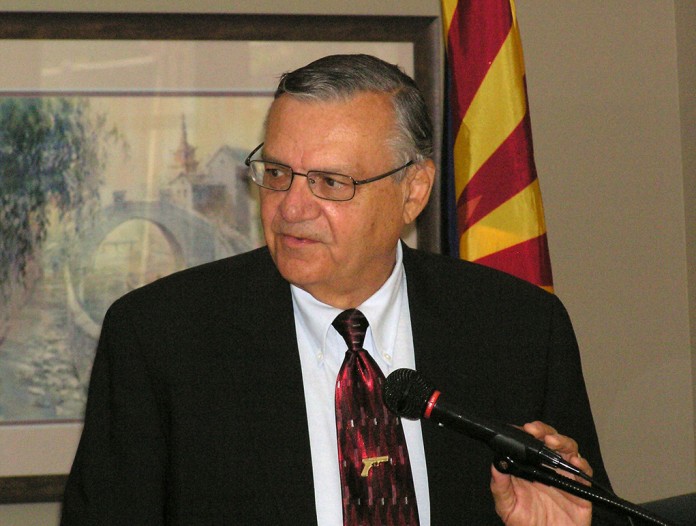PHOENIX – On Oct. 12, 2017, pursuant to U.S. District Court Judge Susan R. Bolton’s request, the U.S. Department of Justice lodged a proposed order to show cause to be used as a “charging document” as to whether Maricopa County Sheriff Joe Arpaio should be held in criminal contempt for violating Federal Judge G. Murray Snow’s Dec. 23, 2011 preliminary injunction in Melendres v. Arpaio.
Snow imposed the injunction, prohibiting the sheriff’s office from enforcing federal immigration law in a case that originated in 2008, accusing Arpaio and MCSO of racial profiling.
On Oct. 11, the DOJ stated its intent to prosecute Arpaio for criminal contempt based on Snow’s Aug. 19 recommendation.
The proposed order to show cause states Snow’s “preliminary injunction also ordered the mere fact that someone was in the country without authorization did not provide, without more facts, reasonable suspicion or probable cause to believe that such a person had violated state law.”
The DOJ claims Arpaio violated that order by causing MCSO to detain persons believed to be in the country illegally but against whom MCSO had no state charges.
The proposed order states, “Therefore, in light of the seriousness of Judge Snow’s orders and the extensive evidence demonstrating Arpaio’s intentional and continuing non-compliance, the court issues a notice to show cause as to whether Joseph M. Arpaio should be held in criminal contempt for the violation of Judge Snow’s preliminary injunction …”
On Oct. 12, Arpaio’s attorneys fired back with an objection to the DOJ’s proposed order to show cause on the basis that it contained improper evidentiary conclusions and did not comport with Rule 42 of Federal Rules of Criminal Procedure.
Attached was a Memorandum of Points and Authorities that claims the DOJ’s lodged order contains improper characterizations of the record, specifically the last clause claiming “extensive evidence” and “intentional and continuing non-compliance.”
The objection continues, “At this stage of the proceedings, no evidence has been admitted. Moreover, there has been no demonstration of intentional and continuing non-compliance by the sheriff under the applicable criminal standard of proof – beyond a reasonable doubt. Importantly, should these characterizations of the record in the civil matter remain in the court’s signed order to show cause, it could potentially have the effect of a factual finding and creates a presumption of guilt rather than innocence. For these reasons alone, the lodged order to show cause should be stricken and the court should order the United States to lodge a new order to show cause that is devoid of such inflammatory rhetoric.”
Arpaio also took issue with the DOJ’s claim that he violated the order by causing MCSO to detain persons believed to be in the country illegally but against whom MCSO had no state charges “and he thereby acted in disobedience or resistance to a lawful writ, process, order, rule, decree or command of a court of the United States.”
However, Arpaio’s objection also states the DOJ’s lodged order to show cause does not set forth with particularity the essential facts constituting how the sheriff actually caused MCSO to detain persons in violation of the preliminary injunction and simply incorporates by reference certain paragraphs of Snow’s criminal referral.
In conclusion, the objection states, “Based on the foregoing, Sheriff Arpaio requests that the court decline the lodged order to show cause filed by the United States and instead, require that a revised order to show cause that does not contain conclusory, inflammatory statements that prematurely adjudicate the facts of this matter and more specifically outline the alleged charges against the Sheriff.
On Oct. 17, the DOJ filed a reply to Arpaio’s objection claiming, among other things, “[T]he facts constituting the government’s entire case need not be contained in the charges listed in an indictment, much less an order to show cause entered pursuant to Rule 42.”
Without signing the proposed order, Bolton issued a minute entry order on Oct. 17, giving Arpaio until 5 p.m. on Oct. 18 to file a reply to the DOJ’s response.





